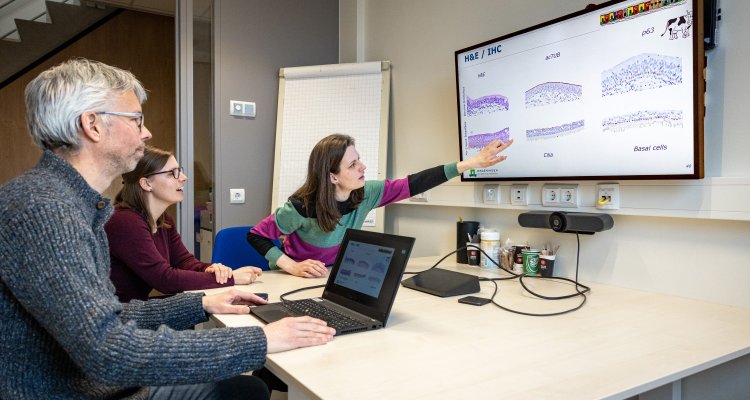
Project
AIR-MUNE
In the project Inversed air-liquid interface models for co-culture of airway epithelium with immune cells (AIR-MUNE) researchers develop innovative air-liquid interface models for bovine and chicken airway epithelial cells to study respiratory pathogens.
Respiratory tract infections are common in livestock and humans and can cause severe disease. However, tools to study respiratory pathogens in vitro are limited. Primary or organoid-based airway epithelial cells (AECs) cultured at air-liquid interfaces are increasingly used for studying the pathogenesis of respiratory virus infections. These models consist of a well-differentiated stratified epithelium containing basal, mucus-forming and ciliated cells, with a top layer sealed by tight junctions. However, a major shortcoming of such in vitro models is the absence of immune cells, which are an important component of the submucosa of the respiratory epithelium in vivo.
In recent years, “upside-down” air-liquid interface models have been described, in which epithelial cells are seeded on the bottom of a transwell filter with the basolateral side ‘up’. The advantage of this model is that immune cells can be added to the top compartment, where gravity will bring them in close contact with the basolateral side of the epithelium. When using transwell filters with a pore size of 3 µm, immune cells can pass the filter and migrate into the epithelium. This system has yielded promising results with human cells, but veterinary applications have not yet been developed.
The objective of the project is to develop upside-down models for bovine and chicken AECs in transwell filters with a pore size of 3 µm. In the bovine model, the researchers will study the impact of immune cells such as primary bovine neutrophils on infection with bovine respiratory syncytial virus (BRSV). In the chicken model, they will study the impact of different types of (innate) immune cells, including natural killer cells (NKs), dendritic cells (DCs) and monocytes on infection with avian influenza virus (AIV). This project will combine the veterinary immunology expertise and tools of CBI with the expertise of WBVR in performing virus infections in ALI cultures.
Progress (September 2023)
This project builds upon the knowledge gained in the project Complex cell systems of airway that was completed by the end of 2022. The researchers are currently making progress in culturing AECs on larger pore sizes to support transmigration of immune cells.